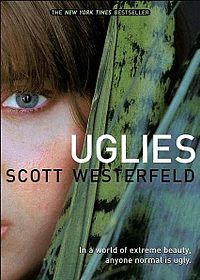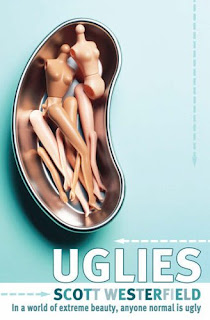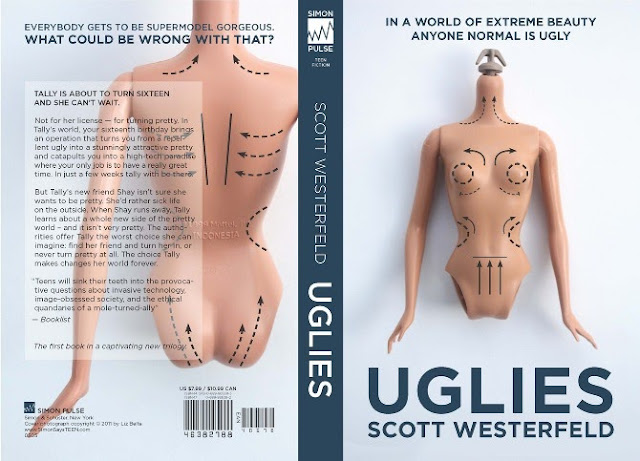I resisted reading this book for so long, and now that I
have, I can say with complete clarity that past me is an idiot.
Seriously, though, I first ran into the series when it was
published in 2005. I was working in a local library at the time, and trawling
the young adult fiction for new reading material (less weird, as back then I
was a young adult myself, or at least closer to it) was one of my favorite
things to do when the library was quiet. Or quieter than a library usually is.
You know what I mean.
Anyway, I didn’t want to read it. It looked like the worst
kind of young adult trash. All hyped up, ubersexualized, and obsessed with
appearances.
So maybe me eight years ago was a little slow on the uptake
and kind of missed what the book was actually about. It happens.
Fast forward to last week, when I was yet again stalking
through my local library (seriously, browsing is not a strong enough word for
what I do there), and I spotted about fifteen copies of the book on the young
adult “Best Reads” shelf.
And I picked one up. I know. Gasp.
Okay, so that story could have been a lot more dramatic, but
that’s pretty much all there is to the tale, sadly. I didn’t pick this book up
for eight years, even knowing that it was extremely popular and pre-dated a lot
of books I’ve loved from this genre (like Hunger
Games and Matched) and even some
I hate (Twilight and anything by PC Cast).
I was wrong, and I would like to apologize for that now.
Because as it turns out, Uglies?
Kind of an awesome freaking book.
Yeah, so it’s a little unusual in the specifics, but the
base of the story is pretty easy to get.
The main character here is Tally Youngblood, an ugly just a
few months shy of her sixteenth birthday, when she’ll be able to get the
surgery that turns her pretty. Being pretty is everything. Literally
everything. If you aren’t pretty then you can’t get a job, can’t find a place
to live – you don’t exist. And pretty is a very reductivist view of beauty: big
eyes, small nose, perfect symmetry, not too much fat but not too little either.
The same height. Everyone looks pretty much the same, but pretty.
Tally really wants the surgery. She’s been dreaming about it
her whole life. Sure, she notices that new pretties are really empty headed and
annoying, including her old best friend Peris, who now seems to barely
recognize her, but whatever. It must be great to be pretty.
Here is the point where our heroine, who’s already shown
that she likes to break the rules and can be a rebel when she wants to, meets a
real rebel. Shay has the exact same birthday as Tally, which means they can
hang out together their whole last summer as uglies without being afraid that
one will abandon the other.
Only Shay doesn’t want to turn pretty. She starts to spout
some weird ideas to Tally – ideas like not thinking you’re ugly just because
everyone says you are. And the idea that there’s life outside of this (never
named) city.
Tally, of course, resists, and this is where the central
conflict of the book comes in. Shay runs away to join the Smoke, a resistance
group that doesn’t believe in turning pretty, and Tally doesn’t. She’s no
Katniss. She shows up for her surgery all excited, only to find that she’s not
allowed. There’s a secret police (Special Circumstances), and they want to know
what she knows about the Smoke. And of course, until she tells them she doesn’t
get to be pretty.
But worse than that, she has to go to the Smoke herself.
This is where the story really kicks off. Not only is
Tally’s journey across the wilderness engaging to read, it’s also interesting
because it shows her developing as a person. As a genuine human being.
It was hard for me to read the first few chapters of the
book, because it all felt so fake and vapid and dull. It took me a bit to
realize that this was on purpose. It’s supposed to feel empty and shallow – it
is. Tally’s life is completely devoid of meaning until she’s told she can’t
have the surgery she’s always wanted. Now she actually has a goal for the first
time in her life, and something to strive towards.
That her goal is a bad one is actually more endearing to me.
I’d rather have Tally grow and figure it out for herself in real time than have
a character arrive fully formed and ready to go. It’s seeing Tally come to the
Smoke and see unpretty people for the first time, having her learn to cook her
own food, value her possessions, work for her supper, and fall in love, that
makes her story all the more compelling.
 It’s fascinating because Tally isn’t really a person before
she goes out to the Smoke. She’s never had to work for anything in her life.
It’s all been handed to her, because she will someday be pretty, and because
hers is a world with no scarcity and no pain. Without pain, there is no
struggle, and without struggle, no value.
It’s fascinating because Tally isn’t really a person before
she goes out to the Smoke. She’s never had to work for anything in her life.
It’s all been handed to her, because she will someday be pretty, and because
hers is a world with no scarcity and no pain. Without pain, there is no
struggle, and without struggle, no value.
Seeing Tally learn about worth is probably the most
rewarding thing I’ve read in a long time.
Anyway, Tally makes it to the Smoke, and starts to fit in,
slowly realizing that she really likes it here and doesn’t want to turn
everyone over to Special Circumstances. Unfortunately, she has to lie to them
all the time so no one realizes that she came there under incredibly shady
auspices. This fractures her relationship with Shay, which only deteriorates
more when David, the camp heartthrob, starts pursuing Tally.
Tally loves the attention, but feels a deep conflict about
what to do. On the one hand, she’s a traitor. But on the other, she does love
it here and she wants to stay.
The best part though? The reason David loves her is because
she has grown as a person. He loves her because she’s so serious. Because none
of this is a game to her. Because she’s the only one who gets how important it
all is. And that’s because she’s a traitor.
There’s more to the story: a revelation that the pretties
are so dumb because they are literally brain damaged, an attack on the Smoke
that takes out everything, Shay getting turned pretty, the whole thing with
David’s parents, a really cool action sequence, and of course, the revelation
of Tally’s treachery at the worst possible time. But what I really want to
focus on is the heart of the story. And that’s Tally.
Like I said before, this is a story about growing up. And
normally I kind of hate those. They’re trite and overdone and usually say the
exact same things: it gets better, life goes on, in ten years you won’t
remember any of this, these are the days you’ll never forget, etc.
All of that is crap.
I love what Uglies
has to say on the matter, because it’s so much more real: growing up is hard
and scary and dangerous and nothing ever gets easier. The questions only become
more difficult, but you become stronger with them. You become better able to
answer those questions, even as they become harder still. It never levels off.
You’re never done. And you’d better fight because no one is going to hand you
anything.
That is true.
Sure, there’s a message in these books about self-acceptance and loving the
skin you’re in, but I think the bigger one is about us. About what it means to
be a grownup, and how numb we can become to what we’re doing with our lives.
Really living means pain, hurt, and wrinkles. But it is so much better than the
alternative.





This comment has been removed by the author.
ReplyDelete